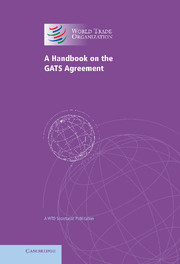Book contents
- Frontmatter
- Contents
- Preface
- Introduction
- 1 Basic purpose and concepts
- 2 Main building blocks: agreement, annexes and schedules
- 3 A closer look at domestic regulation
- 4 How the GATS is administered
- 5 The role and responsibilities of Member governments
- 6 The challenges ahead
- 7 Preparing requests and offers
- 8 Misconceptions about the GATS
- Appendix 1 Understanding your country's services trade
- Appendix 2 Relevant services statistics and classifications
- Annex: General Agreement on Trade in Services
- Index
8 - Misconceptions about the GATS
Published online by Cambridge University Press: 07 October 2011
- Frontmatter
- Contents
- Preface
- Introduction
- 1 Basic purpose and concepts
- 2 Main building blocks: agreement, annexes and schedules
- 3 A closer look at domestic regulation
- 4 How the GATS is administered
- 5 The role and responsibilities of Member governments
- 6 The challenges ahead
- 7 Preparing requests and offers
- 8 Misconceptions about the GATS
- Appendix 1 Understanding your country's services trade
- Appendix 2 Relevant services statistics and classifications
- Annex: General Agreement on Trade in Services
- Index
Summary
SOURCES OF CRITICISM …
Civil society representatives have repeatedly voiced concerns about public policy implications of the GATS. Such concerns revolve, inter alia, around the Agreement's perceived impact on governments' ability to regulate socially important services and ensure equitable access across regions and population groups. It has been alleged that the concept of progressive liberalization, combined with the commercialization of some public services in individual countries, could result in subjecting core governmental activities to external (multilateral) disciplines. There have also been assertions that the Agreement contravenes basic notions of national sovereignty, requiring governments against their will to liberalize access and/or to accept constraints on socially motivated subsidy schemes. While some of these claims may be dismissed as scaremongering, driven for example by income interests of sector incumbents, the complexity of the GATS and the absence, in potentially relevant areas, of authoritative legal interpretations may have added a sense of uncertainty.
In response, the WTO Secretariat has authored, or contributed to, several publications explaining the structure and functioning of the Agreement and, by the same token, debunking frequently traded myths. Relevant sources include a Special Study, Market Access: Unfinished Business, a brief booklet, GATS: Fact and Fiction, and a Joint Study with the WHO, WTO Agreements & Public Health.
… AND THE FACTS
First and foremost, it may be worth reiterating one of the core concepts of the Agreement, the distinction between services liberalization and deregulation.
Information
- Type
- Chapter
- Information
- A Handbook on the GATS AgreementA WTO Secretariat Publication, pp. 48 - 50Publisher: Cambridge University PressPrint publication year: 2005
Accessibility standard: Unknown
Why this information is here
This section outlines the accessibility features of this content - including support for screen readers, full keyboard navigation and high-contrast display options. This may not be relevant for you.Accessibility Information
- 3
- Cited by
